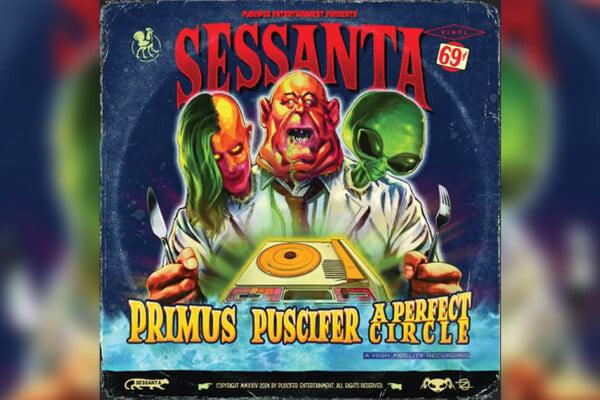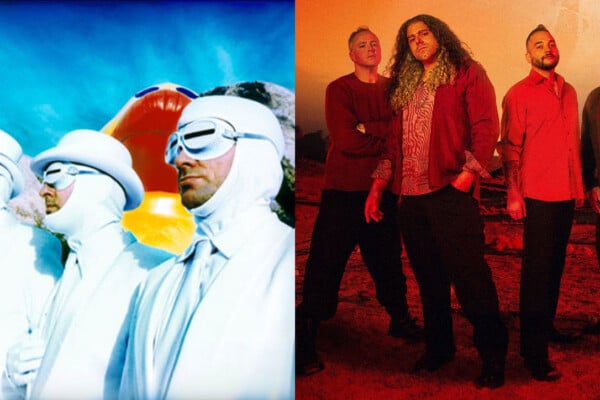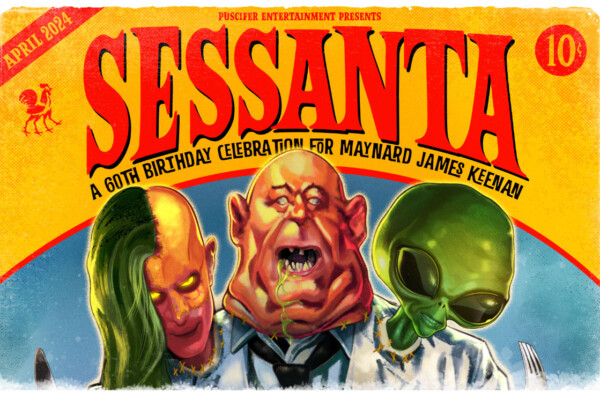Still Fishin’: An Exclusive Interview with Les Claypool
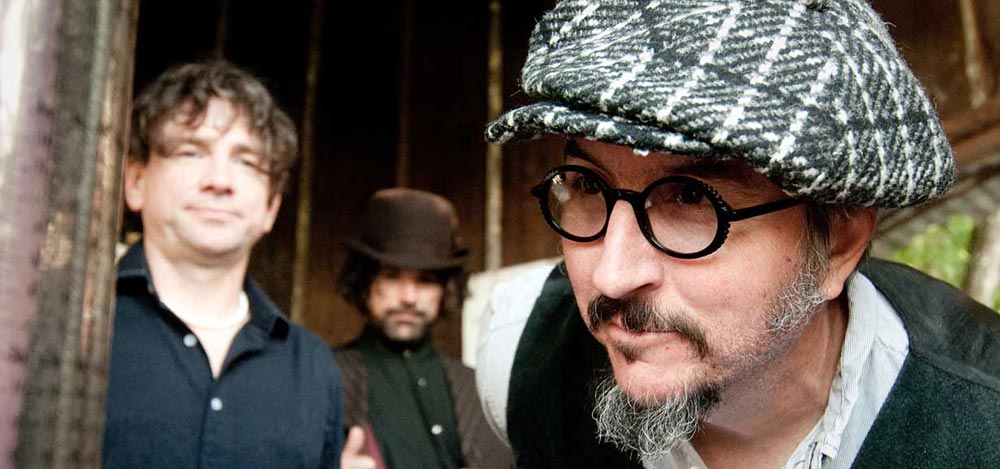
Les Claypool is a man that defies genres and labels. Since picking up bass at an early age, his influences of funk, prog rock and everything in between have melded to create his unique sound, which the bassist admits even he has trouble labeling. Of course, his creativity doesn’t stop at bass playing – Claypool is also an accomplished producer, film maker, and author. Unless you’ve been living under a rock, you’ve seen or heard his work.
Primus is “back on the front burner,” as Claypool would say, after reintroducing original drummer Jay Lane, who replaced Tim Alexander last year. Due September 13th, the quirky trio’s new album Green Naugahyde will be their first full album since 1999’s Antipop.
We got a hold of the intrepid bassist where he told us of the new album, his new bass, his creative process, and drunken mischief with some of the world’s greatest drummers.
The big news right now is that “Green Naugahyde” is coming out September 13th. You’ve had a lot of projects since the last Primus album, so what brought you back?
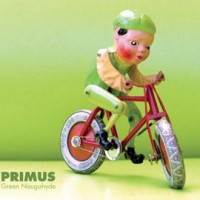 Well we got to the end of our cycle of “Of Fungi and Foe” with my band this last time around. I had new management who happens to be an old friend of mine, and we started kicking around ideas of what’s going to be next. You know, “are we going to do an Oysterhead record, are we gonna work on a film, are we gonna do another solo record?”
Well we got to the end of our cycle of “Of Fungi and Foe” with my band this last time around. I had new management who happens to be an old friend of mine, and we started kicking around ideas of what’s going to be next. You know, “are we going to do an Oysterhead record, are we gonna work on a film, are we gonna do another solo record?”
And there were a couple different people I’ve been talking about collaborating with lately. [Primus Guitarist] Larry LaLonde and I, our friendship had… I don’t want to say rekindled, but we became closer again, and we had been talking. He really wanted to do the Primus thing, but to be honest with you, I wasn’t that excited about it because Primus had just become this nostalgic thing. Mainly Larry got to talking to Tim [Alexander] about it, and he didn’t seem that excited about the notion of doing a record. So we all just came to the conclusion that maybe it’s time for us to move on again from Tim Alexander, and Jay Lane came back into the fold. From the first minute we played with him, there was just this excitement. Larry and I were looking at each other and grinning like bastards because we were playing “Pudding Time” and it’s just got this energy to it that it hadn’t had in so long. From that point on we were chattering like a couple kids about what we were gonna do and what we wanted to do and it was just exciting again.
So it was an easy transition since you’ve been playing with Jay in your other bands in the past few years?
Well Jay has been my go-to guy forever. I used to actually roadie for some bands back in the day that worked with his band. He was in a pretty popular band before Primus had any credibility. And he was kind of the local hero, so when he joined Primus in the late eighties, we were incredibly excited. It was like, “Oh my god, Jay Lane wants to play with us!” So I’ve always been a big fan, and as a drummer – you know I play a little drums – he’s the guy I’ve always stolen my licks from. Him and Stewart Copeland and [John] Bonham are the guys I’ve always tried to emulate, and I’ve been very fortunate to be in bands with two of those three.
And then of course him doing Holy Mackarel and Frog Brigade stuff and Sausage… we have a very intuitive musical relationship. It’s just very easy, he and I. It just comes very natural. And Jay has big ears. He listens to every little thing, and I think that was very exciting for Ler [LaLonde] because he wasn’t trying to find his space anymore as space was given to him, because Jayski just listens to every little thing and accents every little thing. [There are] a few people I’ve played with over the years where we always say, “oh they’ve got big ears,” and Jayski is one of those people.
So you got together before you had ideas for these songs, or did you have some of these songs kind of in your back pocket, and this provided the opportunity to record them?
No, I think there’s a couple riffs there Ler brought in and Jayski brought in, but none of us prior to playing with him were thinking, “let’s make a record.” It was like, “let’s see what can happen here,” more than anything. We did it, and then the juices started flowing. I was really insistent on this record that everyone bring in material, because that hadn’t really happened before. You know, you could count on probably two or three fingers the amount of times that someone besides myself brought in a riff to Primus beyond us just sort of jamming together and coming up with riffs together. It was either I brought in something or we came up with something together in a jam.
And for me, I knew Ler had this cache of riffs he was always reluctant to bring in. I was like, “Ler, you gotta bring that stuff in. Come on, bring in some stuff.” And so he did and I told Jayski, “look, come up with some beats.” So to build off someone else’s stuff is always exciting. That was what was so exciting about Oysterhead. Trey [Anastasio] would come in with some stuff, Stewart [Copeland] would come in with some stuff, and then there was the stuff we came up together. It puts you in a different space.
I wouldn’t have come up with the bass part on “Jilly’s on Smack” if I wrote the song, you know. That song is based on Ler’s arpeggio part. Because, my natural inclination isn’t to sit there and play whole notes if I’m writing [laughs], because I’m thinking in rhythms and whatnot, but here was the foundation, and I was there supporting what he was doing. It’s an exciting place to start, and I think it really helps the record a lot.
It shows, because you guys groove really hard on the album. Of course people say it goes back to the classic Primus sound. Was that a concerted effort to do more groove-oriented over lick-oriented songs?
There wasn’t really a conscious effort to do anything but just play and shoot from the hip. If anything is forced, I tend to not get into it. Things need to flow naturally for me to be excited, and you know the thing is you play with someone like Jay Lane, and he’s got the bounciest groove of anybody I’ve every played with, so it’s difficult to not groove with that guy. He’s got that Minneapolis/East Bay Grease feel that is signature to Jayski.
Where do you get your inspiration for composing? Do you think of bass, or do you think of melody? What is your creative process?
Well it’s always different, you know. Sometimes I’ll have a lyric or I’ll get a line stuck in my head and start building around that. Sometimes it’s a bass part… “Lee Van Cleef” was me sitting around with my dobro bass just twanging away, and I came up with that lick and I really liked it. I had this notion of wanting to write something about Lee Van Cleef, and I just stuck the two together.
For me, I have notebooks full of various ramblings and rantings and writings. Then there’s tapes full of riffs, but I tend to lose those [laughs]. But it’s always different.
“Eternal Consumption Engine”… that’s Ler. That’s Ler’s thing, and I’ve heard that riff of his for years, and I’ve been like, “Come on dude, let’s record that thing. I love that thing.” So he finally brought it in and we did it. I was trying to wrap my head around it, and I had to sit there and think, “What am I going to sing over this?” And I just got into this whole, “eternal consumption engine” thing, you know?
So do you think this is the dawn of a new age for Primus then?
It is the dawn of the new age, just because we’re back after 11 years making a real serious effort at recording. It wasn’t some half-assed EP or us going out and playing old nostalgic tunes. This is us with a new fresh thing. So, I guess sure. It’s the dawn of a new era…What the hell? [laughs]
I don’t think like that. For me, this pot is now on the front burner. It wasn’t on the front burner for a long time. But you know, from looking at it from a fan’s perspective or stepping back from it, yea, there’s a reinvigoration and excitement to this band that there hasn’t been in a long, long, long time.
One of our most popular posts this year was of you jamming on the song “Count Drumula” with Neil Peart, Danny Carey and Stewart Copeland. How did that come about, and are we going to hear any more from that quartet?
You know, that was ol” Stew-Daddy [laughs]. I had been telling him – because he’s become friends with Neil these last few years – “You know, you and Neil should do something together. That would be unbelievable,” and he said, “Oh, yeah, whatever.”
So, then he said, “Look, I’m gonna have this jam at my house and it’s gonna be me and Danny and Neil. You should come down.” So I flew down specifically for this jam, and we met at a sushi restaurant, some fancy sushi restaurant down in L.A., I can’t remember the name of it. I get there and these guys are all hammered [laughs]!You know they had already finished eating pretty much, but they were all hammered. So I’m like, “oh, great.” [laughs] So we go back to Stewart’s house and everybody is just hammered. He’s got a guy that had set up all the mics earlier that day, and we just kinda started banging on stuff, you know. One minute I’m banging on something, next minute I’m playing some bass, and they’re swapping percussion kits and drum kits… But it was just this kind of drunken evening of mischief, and then Stewart took it all and turned it into something and made this little video. It was incredibly fun, and we keep talking about doing it again, so who knows. It’s Stew-Daddy’s thing, so it’s up to him, but I know we had a lot of fun.
I can tell you did from the video.
Yeah, it’s definitely pretty interesting hanging out with three of the greatest contemporary drummers on the planet, and everybody’s just drunk [laughs].
Another big question has been about your new bass that you introduced last New Year’s Eve. Is there any update on that?
Well, I play the prototype, which I’ve totally fallen in love with. I adore that bass. It’s the most comfortable, easiest-to-play, punchiest bass I’ve ever put my hands on. Dan Malone, who is an old friend of mine I’ve known since high school, he’s building them for me, and he’s working on the second one right now, which will be… well we’ll see because I haven’t seen it since he started it.
Basically I’m making these things, and I’m gonna make a handful of them to sell to folks, and if it catches on maybe we’ll make more. But it’s not going to be something there will be a lot of. I’m setting them up to my specifications, so if people like them then they like them and if they don’t, they don’t, but it is, for me, the most comfortable and easiest to play bass I’ve ever stumbled across. A lot of it is because I took various elements from instruments that I like, and different things that I wanted to see out of an instrument that I had never seen before. There’s elements of the Carl Thompsons, elements of the Fender Jazz, elements of Rickenbackers, elements of Precision basses and then there’s the unique elements of things I just like. It’s a very ergonomic bass, and I think it looks cool, too. It looks like a big old can opener.
Well, it’s gotta look good, right?
Yeah, well Jimmy Page says it ninety percent how you look.
Well you can’t argue with that. One of the big things everyone wants to know is what it takes for bassists to be successful, and of course that varies from person to person, but what do you think it was that got you to where you are?
What got me to where I am? Perseverance. You know? I mean, I remember when I was in my mid-twenties and my parents were like, “Ok…,” because I was the guy in my family that was supposed to go to college and I didn’t. And they were like “Ok, how about going back to school? You know this music thing here is fun and dandy, but…” And I just kept plugging and plugging and plugging and plugging and eventually got to where I could make a living at it, then got to where I could make a comfortable living at it.
So it depends on what you want. I mean people ask me about success, and how do you become successful and this and that, but first of all you have to define “what is success?” Is success having the biggest bank account in the world? Is success being on television? Is success screwing as many women as you possibly can?
For me, success is being able to do creatively what you want to do without any hinderance. And also, I’ve got a wonderful family. I’ve got a great wife and kids and a great group of friends, and there are people that will come see me play, at least for now [laughs]! And they have for a long time, because I’m going out there and taking some chances and pushing myself, and trying to find a new path through the jungle all the time. That’s a wonderful thing.
I’ve constantly been told by various forms of management over the years, “Hey, stick with one brand. Build the brand.” And the smart thing for me to have done from a business standpoint would have been to just do Primus forever and nothing but Primus and just support that brand. I see that with many of my friends, but it would drive me insane, and I would be bored. So I don’t know.
First you have to define success. If you want to be a pop star, you go and you listen to the radio and figure out what’s popular and try to replicate that and do that. If you’re going to do something original and unique, it’s a much more difficult road, but it’s extraordinarily gratifying, and I think there’s longevity to what you do. Your coffers probably won’t be nearly as full as the guys in the pop bands, but you know also if you’re part of a trend, when that trend goes away, you go away, too. You have to figure out what you want first. The main thing is do what you like to do. As soon as you start chasing the dollar around, or the trends or whatever, for me I think you start second guessing what your doing and you lose your edge. But that’s just me. Everybody’s different.
One of the last questions that was popular on our Facebook page was “Waffles, or pancakes?”
I like saying the word “pancake”, so I’ll pick pancakes, but I don’t eat either one very often because it just makes me a fat guy.
[Editor’s Note: Special thanks to our Facebook friends who contributed questions/ideas: Clarence Mayhew, John Carroll, Brooks Deihl, James Patrick Scott, Eoin Reddin, Tiburtius V Rubin, Lou Bottini, and Ian Lim.]

